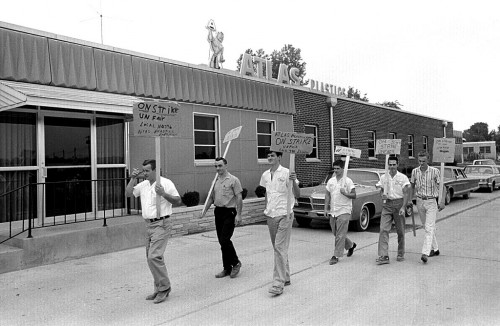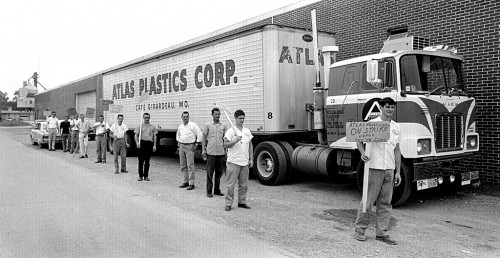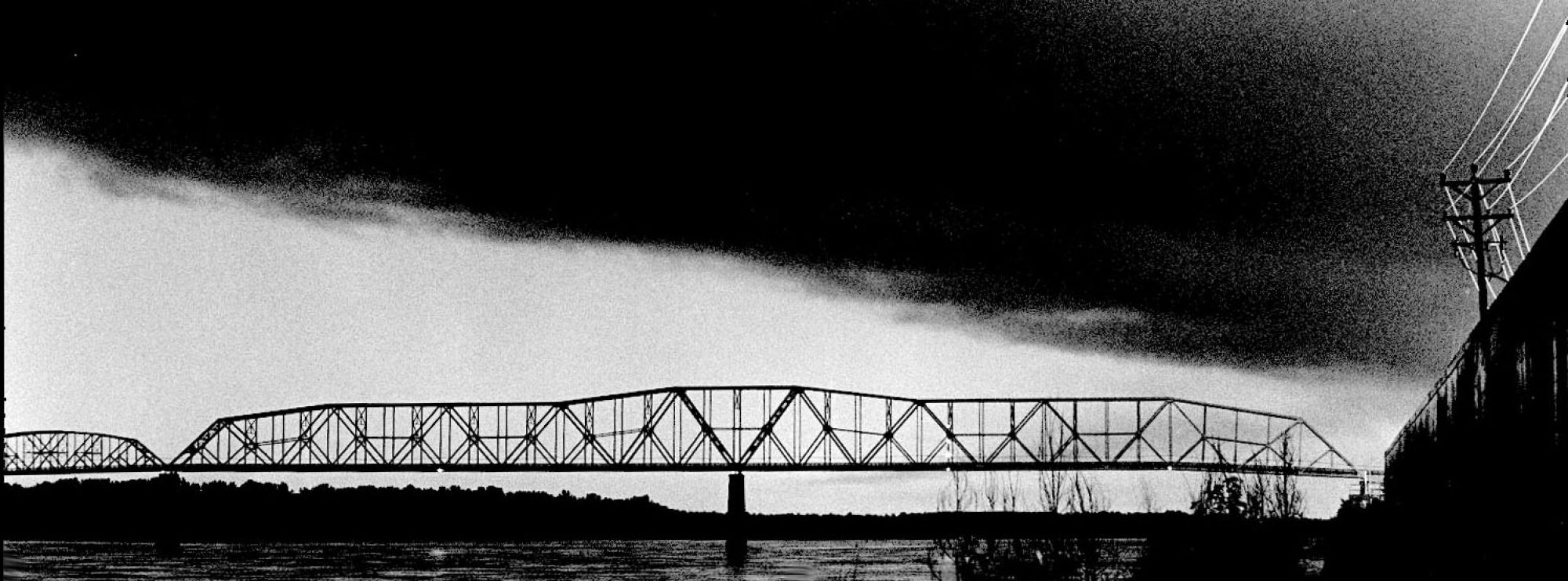 The Missourian caption under my photo on the front page August 29, 1966, read, “A line of pickets bearing signs proclaiming a strike against Atlas Plastics Corp. here march in front of the company offices on Broadview. The walkout began Saturday afternoon. From left, the men are Lawrence Hagan, Glen Grojean, Tom Gibbar, Joe Gockel, Mitchell Gill and Earl Rhodes. (Click on the photos to make them larger.)
The Missourian caption under my photo on the front page August 29, 1966, read, “A line of pickets bearing signs proclaiming a strike against Atlas Plastics Corp. here march in front of the company offices on Broadview. The walkout began Saturday afternoon. From left, the men are Lawrence Hagan, Glen Grojean, Tom Gibbar, Joe Gockel, Mitchell Gill and Earl Rhodes. (Click on the photos to make them larger.)
Albert M. Spradling, the company’s attorney, said the union was asking for an across-the-board wage increase of nearly a dollar an hour plus additional fringe benefits. Atlas Production workers earned an average of $1.88 per hour, Spradling said.The company wanted to spread the increase over a three-year contract; the union was holding out for a one-year agreement.
Atlas was third Cape strike
 A September 21, 1968, story said that a walkout of 200 employees had shut down the Atlas plant, the city’s third industrial strike in three months. The International Brotherhood of Electrical Workers Local went on strike July 29 at Davis Electric Co., and IBEW Local 1601 employees of Superior Electric struck Aug. 18. I wonder if these strikes were tied in with the parent and student protest at the Jackson Junior High School in 1964.
A September 21, 1968, story said that a walkout of 200 employees had shut down the Atlas plant, the city’s third industrial strike in three months. The International Brotherhood of Electrical Workers Local went on strike July 29 at Davis Electric Co., and IBEW Local 1601 employees of Superior Electric struck Aug. 18. I wonder if these strikes were tied in with the parent and student protest at the Jackson Junior High School in 1964.
Six employees were arrested September 24, 1968, when they blocked a truck leaving the plant after being served a restraining order.

Now these guys look like strikers…and funny I don’t remember any of this. I guess social protest and making a buck was not too high on my radar on those days. In 1966 I was working at the Capaha Pool in summer and just out of high school and the world my world had not opened to this yet. I made $.75 an hour so those guys striking that were already making $1.88 an hour average probably had me wondering of their sanity! In those days making $100 a week was the holy gail of jobs and these guys were doing it!
I remember my first real job in 1970 teaching in Memphis for $6,200 a year and I was in tall cotton. Of course I bought new Toyato Carolla for about $2,300 so that was okay. Making $1.88 and hour is okay if food is $10.00 a week and gas is $.25 a gallon.
Dont recall Cape strikers either. Worked at Burger Chef for 85 cents an hour…woopee…then at Coca Cola for $1.00 – $1.20 an hour….big bucks. Later for Stokely Van Camp in Wisconsin. Started grunt work at $1.85 but made $2.20 when I got the forklift job.
At AT&T I payed the C.W.A. union around $100.00 a month for the privilege of being a member and there was no choice. I always looked at unions as a bitter sweet pill.
Terry, I’m sure you where in the N.E.A in Memphis
if i am not mistaken,charlie harris owned or was part owner of altas plastics. they had another palnt in salton city calif.now is spartech?
Charlie Harris was listed as chairman of the board and a major stockholder in the September 25 story.
Mr. Harris had labor problems at some of his other companies as well. When the union representing the shop employees brought in their demands for increased everything at Harris Motor, he quipped, “I’d love to help you fella’s, but you no longer work for me.” And shut the dealership that his father had begun about 1914 down.
Ken, are you going to also cover one of Cape’s nastiest strikes – at the Missourian?
I wasn’t aware that The Missourian had any unions or strikes. When did this happen? It certainly wasn’t during the period when I worked there.
I remember when the Missourian workers tried to organize. It was early to mid 70’s. Harry would not have anything to do with it. The press workers changed all the press settings when they left work one day and walked out. Harry brought in a team of newspaper strike busters (I think from Memphis) to come in and recalibrate the press so they could get a paper out the next day. Needless to say there was no union and the whole press room lost there jobs except for one guy. Can’t remember his name
Apparently there was little coverage of the event. Prior to the job action, the Missourian Building had large windows in the printing room from which locals could watch the paper printed. Mr. Naeter was so concerned that the picketers might try to damage the press, he had the openings bricked over which remains to this day – a lingering reminder of past labor strife.
Watching the presses running was always fun. When I was a paperboy, we had to come to the paper to pay our bills and pick up the papers.
We’d stand outside the window watching The Big Iron turning and groaning when “the presses would break,” postponing when we’d get our papers and could get on the road.
I learned later that they weren’t “breaking:” they were being stopped to change the cylinders to make corrections or other changes.
I had assumed that the windows were bricked over because of the civil unrest that was taking place all over the country. It doesn’t take much to damage a press. I didn’t connect it with labor problems at The Missourian.
I’m not surprised that there was little coverage. Freedom of the Press belongs to he who owns one.
My wife-to-be and I were eating supper at the Colonial Tavern Inn in the ’67 or ’68 era one evening when Al Sanders, who ran the place, asked me why I wasn’t out ‘coon hunting with my dad. I told him I was too busy walking a picket line at Superior Electric. Then a man at another table started chewing my rear end about being on strike. Mr Sanders came to the rescue and talked to him and calmed things down. After the man and his friends left Al told me that it was a Mr Fronabarger from the Missourian that was aggravated with me. I didn’t understand what row was all about at the time but perhaps he was already sensitive about the subject because of “Organizing” activities at the time.
Ken,
Regarding the 1966 Atlas Plastic’s strike, I was sort of in the middle of it. I had worked there for a year or two, was a class B extruder operator, and voted the union in. I was making $1.43 an hour, which included 10 cents for working the second shift. At one time, I worked 3 months in a row without a day off. When we came to work on a Friday, we didn’t know if we had to work that weekend or not, until it was posted on the bullentin board. We voted the Chemical Workers Union in and started to meet with the conpany for more wages and work conditions. After three months, with no retroactive talk from Atlas, meetings were postponed, I came in on the 11:00 o’clock shift, and asked the guy I was relieving how the talks were coming along, he said ” everything was postponed because the attorneys for Atlas was going to Canada for a 2 week fishing trip. I then went to my machine and started to shut it down. You must remember, I was just 21 years old. The workers asked me what I was doing and I told them I am going on a 2 week fishing trip. The next thing you know, everyone started shutting down their machines, and we walked out. Made up cardboard signs, and started picketing. I remember McDonalds sent food, Colonial Tavern sent food and coffee, and the Donut Drive-in sent donuts. We called KGMO radio and gave them the ” scoop “. The strike, I believe, lasted 2 weeks. I received around a dollar per hour raise, and the company had to notify us a week in advance regarding weekend work. Finally, I could spend some time with my family. The overtime stopped, but with the raise, it worked out okay. Hard to believe it was 45 years ago.
Thanks,
Jim
Thanks for giving the inside scoop.
One of the paper’s stories mentioned workers shutting down their machines (and had Atlas talking about how that might have damaged the equipment), but no details. Reading between the lines, it sounded like the workers (you, I see now) were way ahead of your union in taking matters into your own hands.
My father (Stanley Martin Chase) was the first President (and founder I think) of Atlas Plastics in about 1960. He chose to step down (and out) in 1962, when the Board, he felt, refused to back him in making liberal, progressive changes. Does anybody have memories of his time there, or any information about the controversy between the Board and his Presidency?
What other locations were used by atlas plastics? Richmond in? Mankato mn?
My father was President of Atlas Plastics in 1960-61. He was forced out by the Board for trying to promote an African American employee. We left Cape Girardeau in February of 1962. If anyone has any stories of the time my father, Stanley Martin Chase, was there, my sisters and I would be so grateful to hear them. Our dad died in 1969.
Karen,
Stories like yours are a sad reminder that Cape may not have been as enlightened as we might like to think.